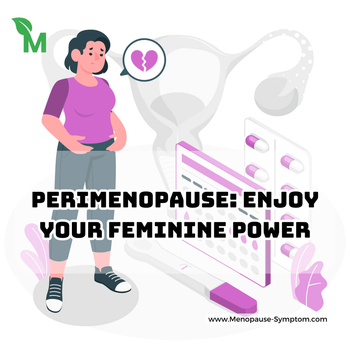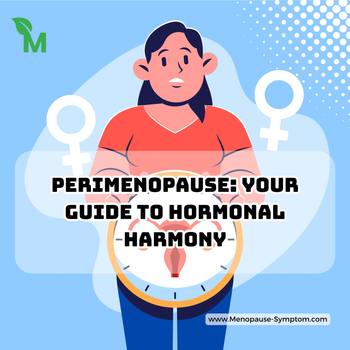After this stage, women will enter menopause - the cessation of menstruation, meaning that ovulation does not occur anymore, menstruation will disappear and the ability to reproduce will no longer be possible. This is the period that marks the gradual decline of estrogen and progesterone hormones, leading to many unpleasant symptoms, including hot flashes. Hot flashes can make you feel uncomfortable, affecting the quality of life. However, not all symptoms of perimenopause are scary. By learning the right way, you can find great solutions to help you overcome this period more easily.
Hot flashes are one of the most common symptoms of perimenopause. It is often described as a feeling of heat in the face, neck and chest, lasting from a few seconds to a few minutes. This feeling can be accompanied by sweating, even palpitations. Many women experience this condition, but don't worry, there are many ways to control it.
The first solution you should consider is changing your diet. A balanced diet rich in fiber, vitamins and minerals will help improve overall health and reduce the symptoms of perimenopause. You should supplement with foods rich in omega-3 such as salmon, chia seeds and walnuts, because they are not only good for the heart but also help reduce hot flashes. In addition, fruits and vegetables are also important food sources, providing necessary vitamins, supporting the body to cope with perimenopause.
In addition, regular exercise is also a great solution for hot flashes. Exercise helps the body produce endorphins, hormones that help improve mood and reduce the discomfort caused by hot flashes. Activities such as yoga, walking or swimming are all great options. Maintaining an active lifestyle not only improves your body but also helps you feel more comfortable during perimenopause.
An important factor in reducing hot flashes is stress management. Perimenopause can cause a lot of stress and anxiety. Relaxation techniques such as meditation, deep breathing or taking art classes can help you relieve stress. For example, meditation can help reduce hot flashes, because it calms the nervous system and helps you find peace.
In addition to natural remedies, you can also consult your doctor about using hormone replacement therapy (HRT). Some hormone therapies can help regulate the levels of estrogen and progesterone in the body, thereby reducing hot flashes. However, the use of hormone replacement therapy needs to be consulted, guided and monitored regularly by a doctor to ensure safety and effectiveness.
In addition, one of the other natural ways to reduce perimenopause symptoms is to use herbs. Certain herbs such as angelica, jujube , reishi, chamomile tea, and soybean oil have been studied and shown to have positive effects in reducing hot flashes. You can look for supplements containing these herbs to help you during perimenopause.
It is important to note that lifestyle changes can not only help you cope with hot flashes, but also bring many long-term health benefits. By taking care of yourself, you will not only feel more comfortable during perimenopause, but also build a strong health foundation for the years to come.
There is no denying that perimenopause is a challenging time in every woman's life. However, it is also an opportunity for you to review your health and make positive changes. Instead of worrying about hot flashes and other symptoms, find ways to improve your quality of life.
Don’t forget that sharing your experiences with other women in the same situation is also a great way to get through perimenopause. Connect socially, join social media groups or attend meetups to discuss the problems you are facing and find positive solutions together. This will not only help you feel less alone but also help you find great tips from others who have gone through this stage.
Perimenopause is not the end but a new chapter in a woman’s life. See this as an opportunity to take care of yourself and fulfill dreams that you may have never had the chance to achieve. By looking positively at perimenopause and the challenges that come with it, you will be more likely to find great solutions to overcome this stage.
Finally, remember that everyone has a different experience with perimenopause. Finding personal solutions and actively facing the changes are the keys to getting through this period. Take the time to listen to your body and take care of yourself in the best way possible. With patience and determination, you will find great ways to reduce hot flashes and experience perimenopause more poetically.
Believe me, you are not alone in this journey. Millions of women are sharing their experiences and finding solutions to overcome perimenopause. Therefore, nothing is impossible. Be a strong and confident woman on this journey. Perimenopause can be a challenge, but it is also full of opportunities for you to grow and improve yourself.
Source: Team MPS compiled, analyzed and wrote. Please dont reup without source. Many thanks.

Beyond Hot Flashes: A Holistic Approach To Perimenopause
Invalid Date
Perimenopause is an important stage in a woman's life, but not everyone really understands it. Many people only know perimenopause through hot flashes, but in fact, this is a remarkable transition period with many other changes.

Perimenopause: Enjoy Your Feminine Power
09.02.2024
Perimenopause is a natural stage in a woman's life, usually occurring between the ages of 40 and 55. This is a time when many changes occur in a woman's body, from health to psychology and emotions.

Perimenopause: Your Guide To Hormonal Harmony
Invalid Date
Perimenopause is a natural stage in every woman's life, usually occurring between the ages of 30 to 50. This is the time when the body begins to change, with a decrease in the production of the hormones estrogen and progesterone.
